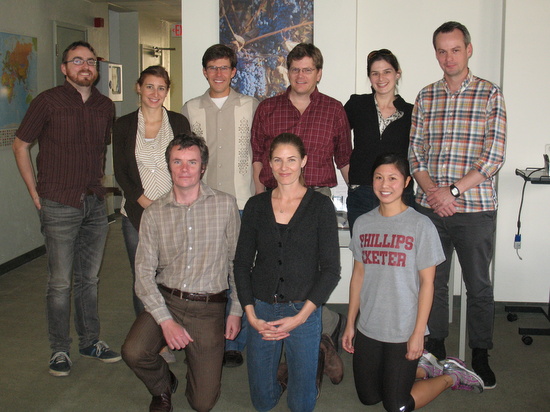NCEAS Working Groups
Forecasting phenology: Integrating ecology, climatology, and phylogeny to understand plant responses to climate change
Project Description
Plant phenology, the timing of seasonal events such as budburst and flowering, is an important indicator of climate change. Across the globe many plants have shifted their timings to track earlier springs and later autumns. Such shifts have important consequences because plant phenology is intimately linked with ecosystem services such as pol¬lination. Plant phenology is also linked with competition between different species and individuals, and may thus shape plant and animal communities. Most research to date, however, has focused primarily on doc¬umenting species responses without developing a detailed understanding of why some species vary with climate and others do not. Our working group includes researchers from the fields of ecology, evolution, and climatology, and will use data from Europe and North America to improve our understanding of plant phenological responses to climate change. We will address a number of questions including:
(a) Do certain habitats, for example temperate forests or deserts, tend to show similar changes in plant phenology with climate change?
(b) Do plants that are closely related tend to show similar phenologies?
(c) Do short-term, small-scale experiments that increase temperatures and are designed to rep-resent climate change actually predict long-term trends?
This research should improve the design of future climate experiments, and should also help to pre¬dict which species are most vulnerable to extinction under climate change. Additionally, our work will develop new approaches for how to better use climate data in ecology and will inform the designs of government phenological data inventories and new citizen science projects such as Project BudBurst and the US National Phenological Network.

Principal Investigator(s)
Benjamin I. Cook, Elizabeth M. Wolkovich
Project Dates
Start: May 1, 2010
End: December 11, 2012
completed
Participants
- Jenica M. Allen
- University of Connecticut
- Toby R. Ault
- University of Arizona
- Julio L. Betancourt
- US Geological Survey (USGS)
- Kjell Bolmgren
- Swedish University of Agricultural Sciences
- Elsa E. Cleland
- University of California, San Diego
- Benjamin I. Cook
- NASA Goddard Institute for Space Studies
- Theresa M. Crimmins
- USA National Phenology Network
- T. Jonathan Davies
- McGill University
- Heather Kharouba
- University of British Columbia
- Nathan J.B. Kraft
- University of British Columbia
- Lesley Lancaster
- University of California, Santa Barbara
- Susan J. Mazer
- University of California, Santa Barbara
- Gregory J. McCabe
- US Geological Survey (USGS)
- Brian J. McGill
- University of Arizona
- Abe Miller-Rushing
- USA National Phenology Network
- Camille Parmesan
- University of Texas, Austin
- Stephanie Pau
- University of California, Santa Barbara
- James Regetz
- University of California, Santa Barbara
- Nicolas Salamin
- University of Lausanne
- Mark D. Schwartz
- University of Wisconsin, Milwaukee
- Steven E. Travers
- North Dakota State University
- Elizabeth M. Wolkovich
- University of California, San Diego
- S. Joseph Wright
- Smithsonian Tropical Research Institute
Products
-
Journal Article / 2011
Northern Hemisphere modes of variability and the timing of spring in western North America
-
Journal Article / 2012
Phenological tracking enables positive species responses to climate change
-
Journal Article / 2012
Divergent responses to spring and winter warming drive community level flowering trends
-
Journal Article / 2012
Sensitivity of spring phenology to warming across temporal and spatial climate gradients in two independent databases.
-
Journal Article / 2012
Incompletely resolved phylogenetic trees inflate estimates of phylogenetic conservatism
-
Journal Article / 2013
Phylogenetic conservatism in plant phenology
-
Journal Article / 2018
Phylogenetically weighted regression: A method for modelling nonâstationarity on evolutionary trees
-
Journal Article / 2018
Global shifts in the phenological synchrony of species interactions over recent decades
-
Journal Article / 2013
Flowering date of taxonomic families predicts phenological sensitivity to temperature: Implications for forecasting the effects of climate change on unstudied taxa
-
Journal Article / 2012
Influences of the El Nino southern oscillation and the pacific decadal oscillation on the timing of the North American spring
-
Journal Article / 2011
Predicting phenology by integrating ecology, evolution and climate science
-
Journal Article / 2013
Clouds and temperature drive dynamic changes in tropical flower production
-
Data Set / 2011
Phenology literature review
-
Data Set / 2012
Network of ecological and climatological timings across regions (NECTAR)
-
Data Set / 2012
STONE: Synthesis of timings observed in increase experiments
-
Journal Article / 2012
Warming experiments underpredict plant phenological responses to climate change
-
Data Set / unknown
Mikesell phenological data from Wauseon, Ohio, USA 1883-1912
